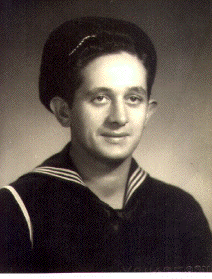
My Father
Despite my parents' conventionality, they taught me to place a
positive value on nonconformity. The word different, around our
supper table, could be used defensively, in praise, or as an expression
of dubiety (as in, when my father one night added curry powder
to the rice, my mother-- who hated rice anyway-- said "that's
different"). Their constantly expressed attitude that it was
a sign of strength to swim against the current proved essential
for my surviving my parochial school experience, particularly
from the fourth grade on. (And later it taught me to construct
myself as a locally famous personality in the last two years of
high school-- after having spent the first two years as a "weird,"
socially ostracised outcast.) Not only was I marked in the second
grade by being obliged to swallow a teaspon of sticky liquid yellow
prescription medicine from the hands of Mrs. Covington while the
entire class-- straining at the leash to be led off to lunch--
watched, but something more mysterious-- which I only later, as
an adult, identified as class-- marked me in the very small world
of church and school, where I was never quite right, even when
by some miracle I happened to be clothed in the style of my standard-setting
classmates. I didn't have a clue to understanding this difference
until, in my twenties, I discovered-- in theory-- the existence
of class.
When in 1958 we moved into "town"-- i.e., into a suburban neighborhood--
I saw nothing but differences between my family and the neighbors.
Both of my parents held jobs, which was bad enough, but my father
worked at night, when most of the world slept. (Which meant,
lucky for me, that he was there in the afternoon when I got home
from school.) My mother did not cook or sew, and when she tried
to do either of these things, we all suffered for it. My father
was a wonderful cook. Like clockwork, he had supper on the table
at five sharp, every night, when my mother was expected to pull
into the driveway, home after a hard day's work keeping a company's
books. The neighbors thought this "unnatural" arrangement was
terrible, but given my father's stocky, powerful build, his reserved
personality, his recent past as a truck driver and owner of an
Indian motorcycle, and his macho position as a factory foreman,
the neighbors' opprobrium could not impugn his "manhood." (My
mother, naturally, and her supposed lack of womanliness, was the
primary target of their outrage.) Hardly a suppertime went by
that my parents didn't preach the gospel of noncomformity. This
gospel didn't take with the brother who was eleven months my junior,
but it rooted itself in fertile ground in me-- to my parents'
later-- and openly rueful-- regret.
